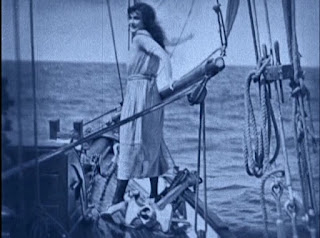It’s better to burn out than fade away as old Neil Young observed from the safety of his thirties… yet how would you feel if you’d done both? Sixty years after her silent flame flickered so brightly did Louise Brooks spend her days in doubt and remorse?
As with politicians, actors’ careers often end in failure – a life measured by success, commercial and critical popularity, appreciation of your talent and your looks (although I think we’ve all got to contend with that…). Few had the visceral, visual impact of Louise Brooks nor the unique combination of intellect and beauty than enabled her to transcended the self-made mess of her Hollywood years to become an icon; her posters and postcards the gateway experience to a face that still compels attention and repeated viewing.
 |
| Any excuse... |
Mildiner bravely takes on the task of recreating one of the most complex personalities in film and succeeds in presenting a version of Brooksie that rings true not just from a fans’ point of view but on a human level.This is in large part down to a titanic performance of wit and integrity from Susan Penhaligon who's Louise fights against the dying of the light in her own way: denying her usefulness and importance, putting down her carers and long-suffering friends as she is slowly weakened by a combination of emphysema and a heart condition.
 |
| Angharad George-Carey and Susan Penhaligon |
She has dreams of her past and relives the brief affair her younger self, played by the sparkling Angharad George-Carey with elfin energy, had with Charlie Chaplin in 1925 New York. Brooks was 18 at the time and a dancer in the Follies just about to embark on a movie contract with Warner Brothers. There’s no evidence that she thought Chaplin was “The One” but in the play their relationship is used to show the intensity of Louise’s character – her near limitless possibilities the near-equal of Chaplin’s own…
 |
| Angharad George-Carey poses as young Louise in Fred's space |
Mildiner appears to suggest that a combination of harsh parenting and her sexual abuse aged nine, may have made Brooks the unyielding truth-sayer and performer she was – who knows? She certainly seemed capable of inspiring loyalty and was supported by financial contributions by an ex-lover for the last few decades of her life.
 |
| Mary Keegan |
Louise rides Phylis hard but this seems to be part delusion and part thank you… Phylis’ husband Frank (Brian Deacon) is not as strong as the women and whilst he makes himself busy Louise always has something more for him to do.
 |
| Susan Penhaligon and Nicholas Waring in rehearsal |
Another visitor is the librarian Tara (Sophia Swannell) who arrives initially to complain about Louise’s annotating the books she borrows with corrections and other “helpful” observations (including one concerning Tyrone Power that I probably shouldn’t repeat in writing). She stands her ground and is accepted.
 |
| Sophia Swannell and Brian Deacon |
Directed by Sarah Berger who makes splendid use of the limited space of Fred’s Place this was close-contact theatre with every emphysematic fit making the audience squirm. I have no idea how the performers can stay so focused mere feet away from their audience but if you want to see how actors really work this is the place to be.
 |
| Angharad George-Carey and Tim Walton rehearse napping |
Don’t waste it… and I’m pretty sure, Brooks, for all her trials, never really did. There are no doubts from Louise who’s only regret was growing old and hating it: if all you wanted to do was dance why love life when you can’t do what you love anymore?
American Venus is part of the Ever Hopefull Repertory Season of plays which completes at Fred's Place today… it deserves a wider audience and hopefully will get another airing. There's a short video about the season here.
 |
| 6 Frederick's Place, just round the corner from Bank station |































































